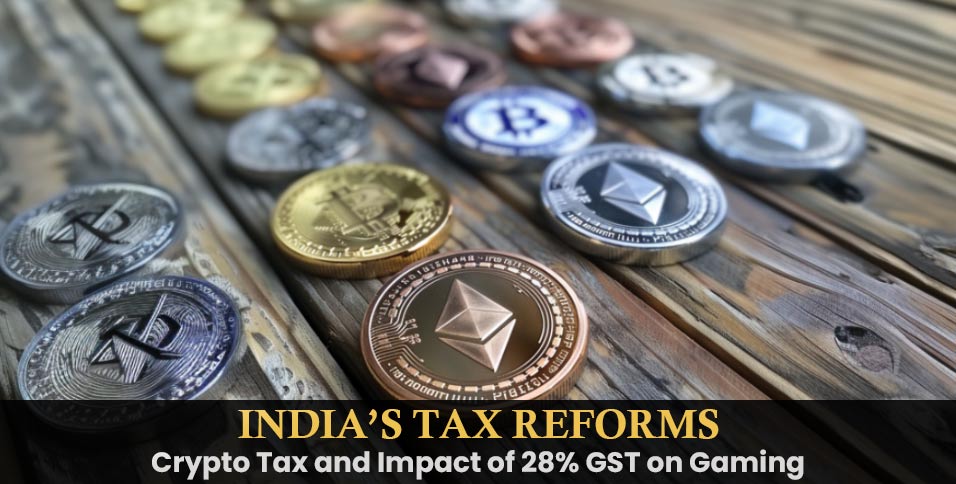India’s tax landscape has seen significant improvements, especially in the areas of cryptocurrency and online gaming. With the introduction of crypto tax and the implementation of 28% Goods and Services Tax (GST) on the gaming sector, the industry faces both challenges and opportunities.
The rise of crypto betting in India
Cryptocurrencies, with their decentralized nature and borderless transactions, have gained popularity in the world of betting, especially in India. The integration of cryptocurrencies on top sites from https://holymolykaiseeno.in/bitcoin-casinos has opened new vistas in the betting landscape of the country, offering convenience, anonymity and instant transactions. The popularity of crypto betting platforms has increased among tech-savvy youth, leading to rapid growth in the crypto betting market.
Regulatory Challenges and Crypto Tax
Despite the growing popularity of crypto betting, India continues to grapple with regulatory challenges in the cryptocurrency sector. The lack of a clear regulatory framework creates both opportunities and threats for operators in the market. Furthermore, the recent introduction of crypto tax adds another layer of complexity to the scenario. The crypto tax aims to regulate the use of cryptocurrencies for speculative activities and ensure compliance with tax laws. This new tax requirement has left many operators and players uncertain about how to manage the emerging regulatory landscape. While some see this as a step towards legalizing crypto betting, others express concerns about the potential impact on industry growth and innovation.
Impact of 28% GST on gaming sector

In a significant development for investors in the online gaming sector, the Government of India has implemented amended provisions under the Goods and Services Tax (GST), imposing a 28% tax rate on the industry. The move has sparked discussion and concerns within the industry due to its potential impact on the growing e-gaming market. Companies specializing in the gaming industry, such as Delta Corp, have seen their share prices fluctuate since the announcement. The retrospective provision of the law has now raised concerns among industry representatives and investors. Additionally, the introduction of the 28% GST rate has started conversations about its impact on the overall gaming ecosystem in India. Some experts argue that high tax rates could deter potential investors from entering the sector, hindering its growth potential. Additionally, stakeholders are concerned about the broader impact on consumer behavior, particularly among casual gamers who may be affected by the higher costs associated with gaming services.
Concerns and discussions at TIOL Tax Congress
The retrospective provision of the law has raised concerns among industry representatives and investors. A panel of experts at the TIOL Tax Congress addressed the issue and expressed hope that both the government and the e-gaming industry will work together to resolve the matter. Industry stakeholders have expressed fears that retrospective taxation could drive potential investors away from the sector, hampering its growth. The lack of clarity regarding the application of the tax and its potential impact on gaming revenues has led to heated discussions within the industry. Many operators are seeking clarification from regulatory authorities to better understand their tax obligations and plan accordingly. Furthermore, investors are closely monitoring developments in the regulatory landscape to assess the long-term feasibility of their investments in the gaming sector.
Navigating the Tax Zone
Navigating the dynamic tax landscape requires the gaming industry to strike a delicate balance between embracing opportunities and minimizing threats. This includes addressing the regulatory uncertainties around cryptocurrencies and adapting to the implications of the 28% GST on gaming operations. Stakeholders should adopt proactive measures, including comprehensive tax compliance strategies and regulatory advocacy efforts. By connecting with policy makers and industry associations, gaming operators can influence regulatory decisions and shape the future of the gaming industry in India. Additionally, investing in strong tax planning and risk management processes can help mitigate the potential impact of regulatory changes on business operations.
Potential Impact on Bitcoin Casinos
Bitcoin casinos that operate on cryptocurrency transactions may face unique challenges and opportunities in light of India’s tax reforms. While the integration of cryptocurrencies offers benefits such as anonymity and instant transactions, regulatory uncertainties and tax implications can create challenges for operators. However, Bitcoin casinos rated by HollyMolyCasino can leverage their expertise and transparency to effectively address these challenges. By adhering to strict compliance standards and implementing strong risk management practices, Bitcoin casinos can build trust with players and regulators, ensuring their long-term success in the Indian market. Furthermore, by providing innovative payment solutions and leveraging blockchain technology, Bitcoin casinos can increase the security and transparency of their gaming platforms, thereby attracting a wider audience of players.
Adapting to regulatory changes
To thrive in the evolving tax landscape, gaming operators, including Bitcoin casinos, will have to adapt to regulatory changes and implement stronger compliance measures. This includes ensuring transparency in transactions, implementing Know Your Customer (KYC) procedures and complying with tax regulations. By embracing regulatory compliance, operators can build trust with players and regulators alike. Additionally, investing in employee training and development programs can help ensure that staff members are equipped with the knowledge and skills needed to meet complex tax requirements. Ultimately, by staying abreast of regulatory developments and proactively addressing compliance issues, gaming operators can set themselves up for long-term success in the Indian market.
Also Read: What Are The Methods By Which You Can Pay Crypto Taxes?















